Introduction
The telecommunications industry faces rapid technological change, complex billing models, and growing customer expectations. Disconnected systems often create inefficiencies and limit visibility across operations. Odoo for Telecommunications, supported by a trusted Odoo Development Company provides a unified ERP solution that centralizes workflows, improves accuracy, and delivers real-time insights to support scalable growth.
1. Why the Telecommunications Industry Needs an ERP System
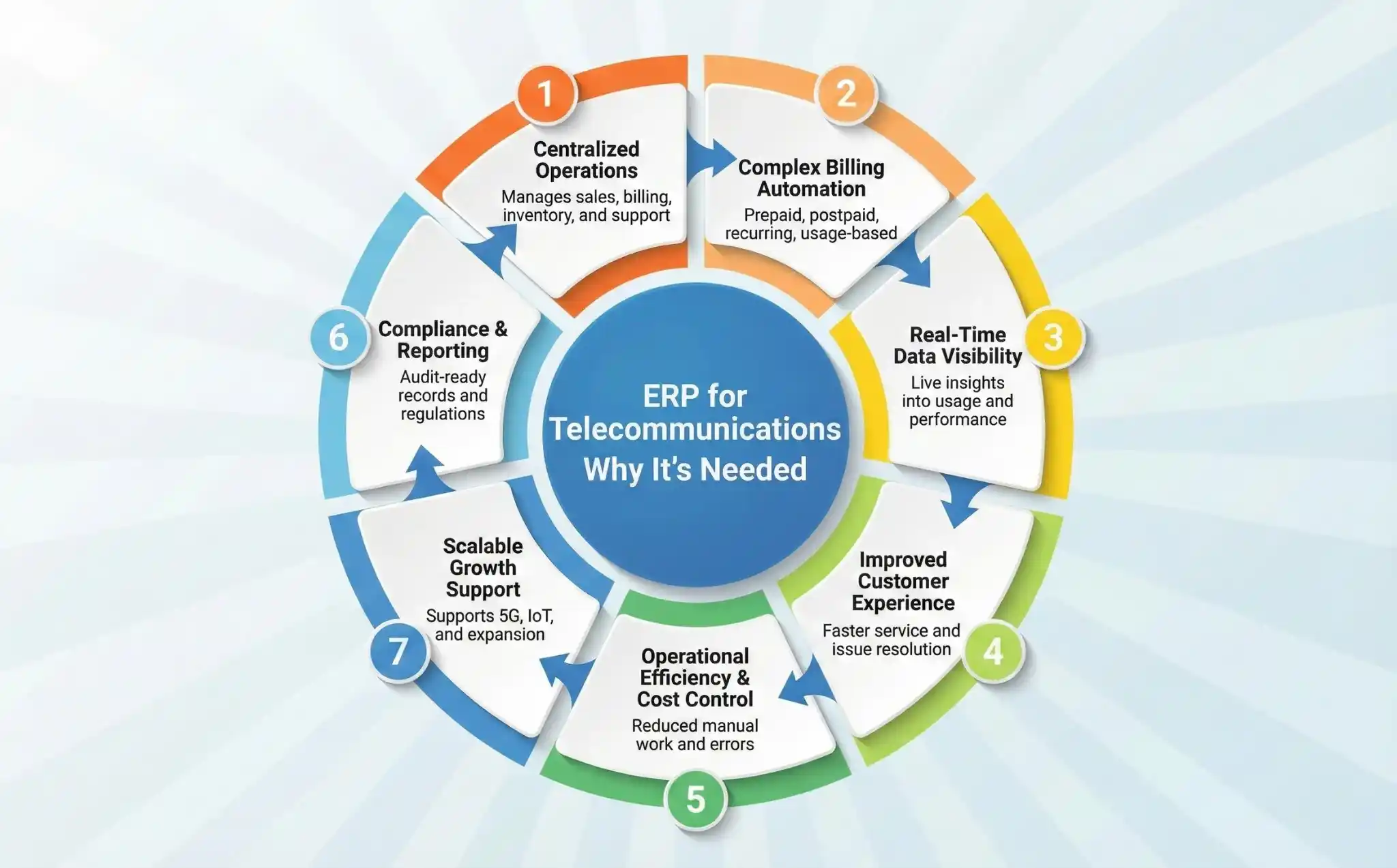
The telecommunications industry operates with complex, high-volume processes that require accuracy, speed, and coordination. Without an ERP system, managing these operations becomes inefficient and difficult to scale.
Key Reasons Telecom Companies Need an ERP
- Centralized Operations Management
Telecom businesses manage sales, billing, customer data, inventory, and support simultaneously. An ERP system centralizes these functions into one platform, reducing dependency on multiple disconnected tools. - Handling Complex Billing Models
Telecom providers often deal with prepaid, postpaid, recurring, and usage-based billing. ERP systems automate billing workflows, reduce manual errors, and ensure accurate invoicing. - Real-Time Data and Visibility
An ERP provides real-time insights into customer activity, service usage, financial performance, and operational status. This allows faster decision-making and better control over daily operations. - Improved Customer Experience
With centralized customer data, ERP systems help telecom companies respond faster to service requests, resolve issues efficiently, and improve overall customer satisfaction. - Operational Efficiency and Cost Control
Automation reduces repetitive manual tasks, minimizes errors, and improves resource utilization. As a result, telecom companies can lower operational costs and improve productivity. - Scalability for Business Growth
As telecom companies expand services like 5G, fiber, and IoT, an ERP system supports growth by adapting to new services, users, and markets without disrupting existing operations. - Compliance and Reporting Support
Telecom businesses must meet strict regulatory and reporting requirements. ERP systems help maintain audit trails, structured records, and compliance-ready reports.
2. Odoo ERP and How It Supports Telecommunications
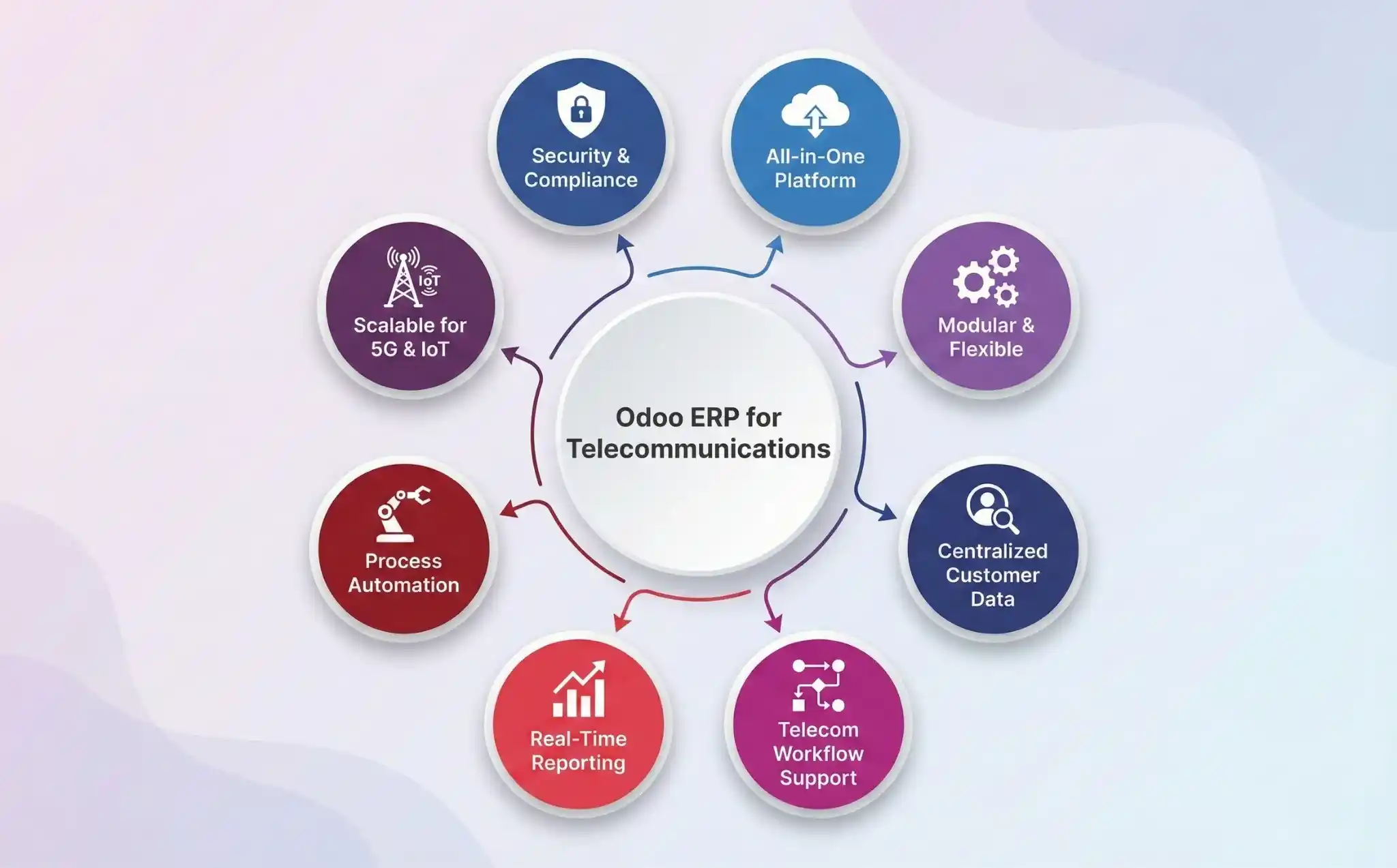
Odoo ERP is a modern, open-source enterprise resource planning platform designed to manage business operations through a single, integrated system. For telecommunications companies, Odoo helps simplify complex workflows, improve visibility, and support scalable growth.
How Odoo ERP Supports Telecom Businesses
- All-in-One Business Platform
Odoo combines CRM, sales, billing, accounting, inventory, support, and project management into one system. This eliminates the need for multiple tools and ensures consistent data across departments. - Modular and Flexible Architecture
Telecom companies can choose only the modules they need and add more as business requirements evolve. This flexibility makes Odoo suitable for both small telecom providers and large enterprises. - Centralized Customer and Service Data
Odoo stores customer information, service plans, billing history, and support interactions in one place. As a result, teams gain a complete view of each customer. - Support for Complex Telecom Workflows
Odoo adapts to telecom-specific processes such as recurring billing, service provisioning, contract management, and multi-service offerings. - Real-Time Reporting and Dashboards
Managers can access live data on operations, revenue, customer activity, and performance metrics. This helps telecom leaders make informed decisions quickly. - Automation of Routine Processes
Odoo automates billing, invoicing, reporting, and task workflows. Consequently, manual effort is reduced and operational efficiency improves. - Scalable for Future Technologies
As telecom businesses expand into 5G, fiber, cloud, or IoT services, Odoo can scale without disrupting existing operations.
3. Key Telecommunications Challenges Solved by Odoo
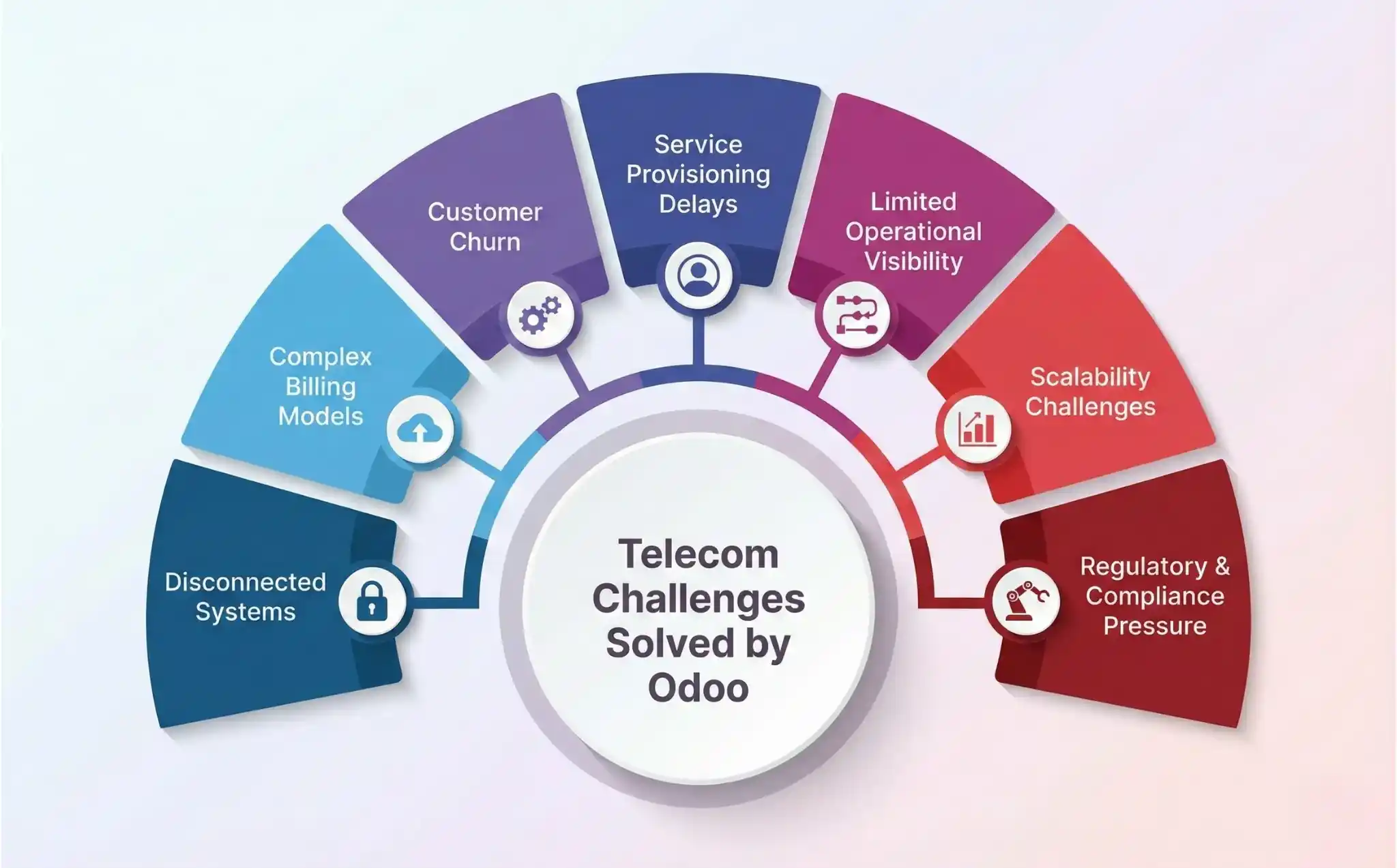
Telecommunications companies face industry-specific challenges that directly impact efficiency, revenue, and customer satisfaction. Odoo helps address these challenges by providing a centralized and automated ERP platform.
Major Telecom Challenges and How Odoo Solves Them
- Disconnected Systems and Data Silos
Many telecom businesses use separate tools for billing, CRM, inventory, and support. Odoo brings all departments onto one platform, ensuring consistent data and better coordination. - Complex Billing and Revenue Management
Telecom billing often includes recurring charges, usage-based pricing, and bundled services. Odoo automates billing workflows, reduces invoice errors, and improves revenue accuracy. - Customer Churn and Poor Experience
Incomplete customer data and slow support responses lead to dissatisfaction. Odoo centralizes customer information, enabling faster issue resolution and more personalized service. - Inefficient Service Provisioning
Delays between sales, billing, and service activation are common. Odoo streamlines workflows so services can be activated faster and more accurately. - Lack of Operational Visibility
Without real-time insights, managers struggle to track performance. Odoo provides dashboards and reports that offer clear visibility into operations, revenue, and customer activity. - Scalability Challenges
As telecom businesses expand into 5G, fiber, or IoT, systems must scale. Odoo’s modular design supports growth without disrupting existing processes.
Regulatory and Compliance Pressure
Telecom companies must maintain accurate records and audit trails. Odoo helps store structured data and generate compliance-ready reports.
4. Key Benefits of Odoo for Telecommunications
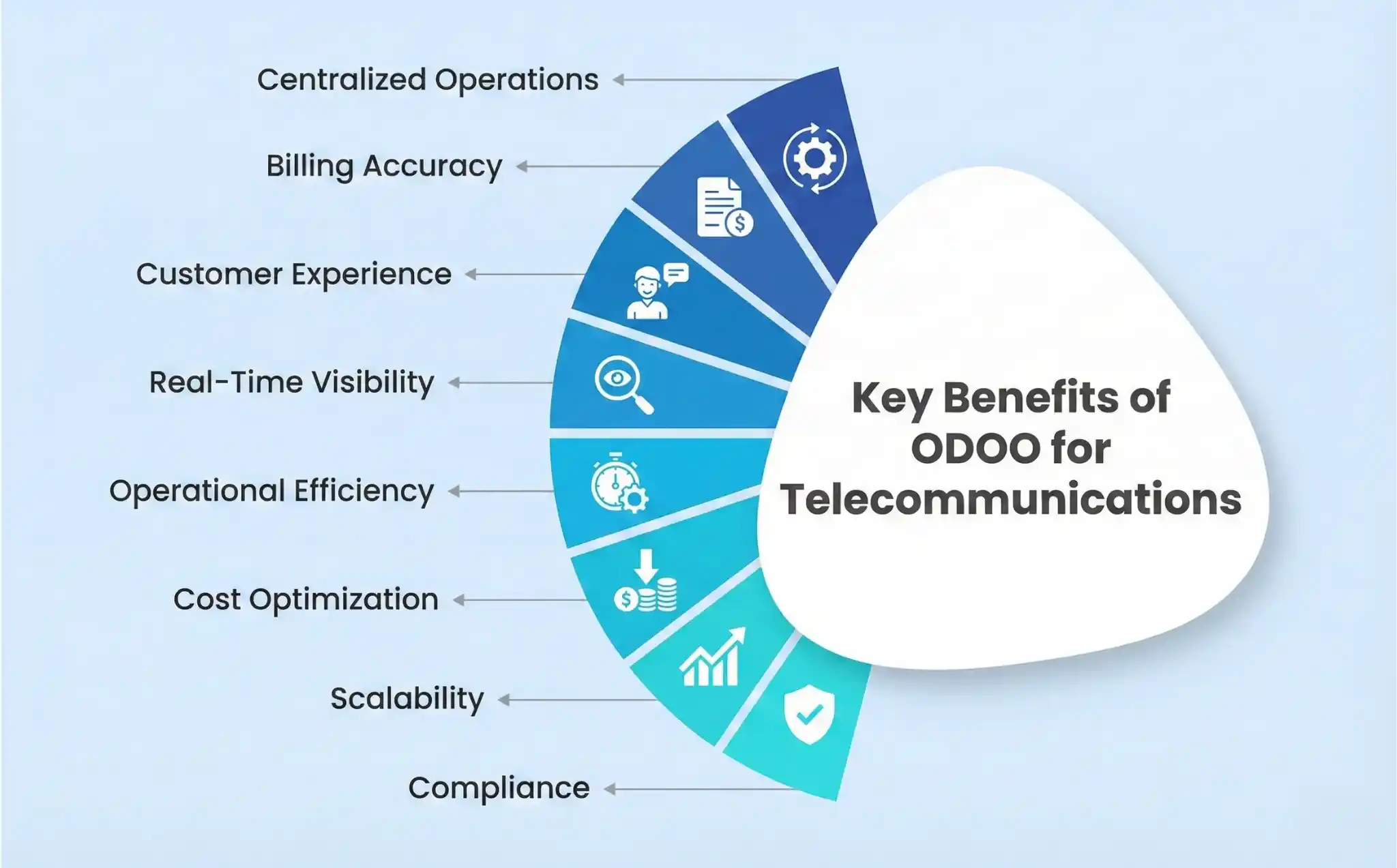
Odoo delivers practical and measurable benefits that help telecommunications companies manage complex operations more efficiently. By using a single ERP platform, telecom providers can improve accuracy, productivity, and customer satisfaction.
Benefits of Using Odoo in the Telecommunications Industry
- Centralized Business Operations
Odoo brings sales, billing, customer management, inventory, finance, and support into one system. This reduces dependency on multiple tools and ensures smooth coordination between departments. - Improved Billing Accuracy
Automated billing workflows reduce manual errors in recurring, subscription-based, and usage-based billing. As a result, telecom companies can prevent revenue leakage and billing disputes. - Better Customer Experience
With all customer data stored in one place, support teams can respond faster and provide more personalized service. This helps reduce customer churn and improve satisfaction. - Real-Time Business Visibility
Odoo provides live dashboards and reports that show key metrics such as revenue, customer activity, and service performance. Therefore, decision-makers can act quickly and confidently. - Operational Efficiency and Automation
Routine tasks like invoicing, reporting, and order processing are automated. This reduces workload, saves time, and improves team productivity. - Cost Optimization
Better inventory control, accurate billing, and reduced manual work help telecom companies lower operational costs and improve profitability. - Scalability for Future Growth
Odoo’s modular design allows telecom businesses to add new services, users, and regions without replacing their existing system. - Support for Compliance and Audits
Odoo maintains structured records and audit trails, making it easier to meet regulatory and compliance requirements.
5. Use Cases of Odoo in the Telecommunications Industry
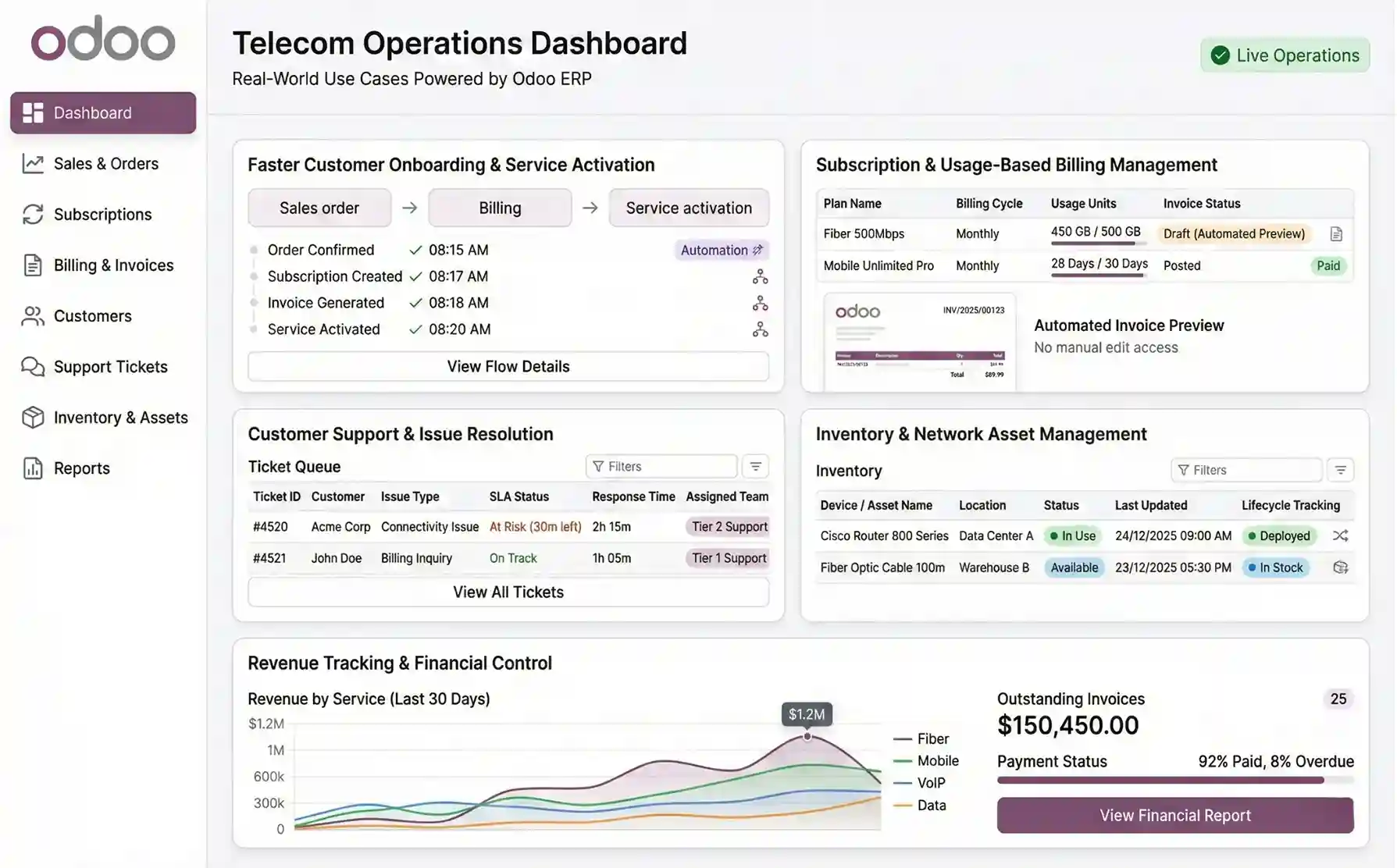
Odoo supports a wide range of real-world telecommunications use cases by connecting business operations into a single, unified system. These use cases demonstrate how telecom companies can improve efficiency, accuracy, and customer experience using Odoo.
Faster Customer Onboarding and Service Activation
Telecom companies often face delays between sales, billing, and service activation.
With Odoo, businesses can:
- Connect sales orders directly to billing and provisioning
- Automate customer account creation
- Reduce manual handoffs between teams
- Activate services faster and more accurately
As a result, customers experience quicker onboarding and improved satisfaction.
Subscription and Usage-Based Billing Management
Telecom billing models are complex and require precision.
Odoo helps by:
- Managing recurring subscriptions
- Supporting usage-based and tiered pricing
- Automating invoice generation
- Reducing billing errors and disputes
This ensures accurate billing and stable revenue flow.
Customer Support and Issue Resolution
High-quality customer support is essential in telecommunications.
Using Odoo, telecom providers can:
- Centralize customer interaction history
- Track and manage support tickets efficiently
- Assign issues to the right teams
- Monitor response and resolution times
Consequently, support teams can resolve issues faster and improve service quality.
Inventory and Network Asset Management
Telecom companies manage large inventories of devices and network equipment.
Odoo supports this by:
- Tracking inventory across multiple locations
- Managing network assets and equipment lifecycle
- Monitoring stock usage and availability
- Reducing losses and unnecessary purchases
This leads to better planning and reduced operational costs.
Revenue Tracking and Financial Control
Accurate financial management is critical for telecom businesses.
Odoo enables companies to:
- Track revenue across services and customers
- Monitor payments and outstanding invoices
- Generate financial reports in real time
- Improve cash flow visibility
As a result, finance teams gain better control and transparency. These capabilities play a key role in optimizing telecom service delivery using Odoo ERP by reducing delays, improving coordination, and enhancing customer experience.
6. Inventory, Asset, and Network Management with Odoo for Telecommunications
Effective inventory and asset management is essential in the telecommunications industry, where companies handle large volumes of network equipment and infrastructure across multiple locations. Without centralized control, this often leads to delays and higher costs. Odoo for Telecommunications provides a unified system to manage assets efficiently while also supporting data center orchestration with Odoo, helping automate infrastructure operations and improve overall efficiency.
Centralized Inventory Management Across Telecom Locations
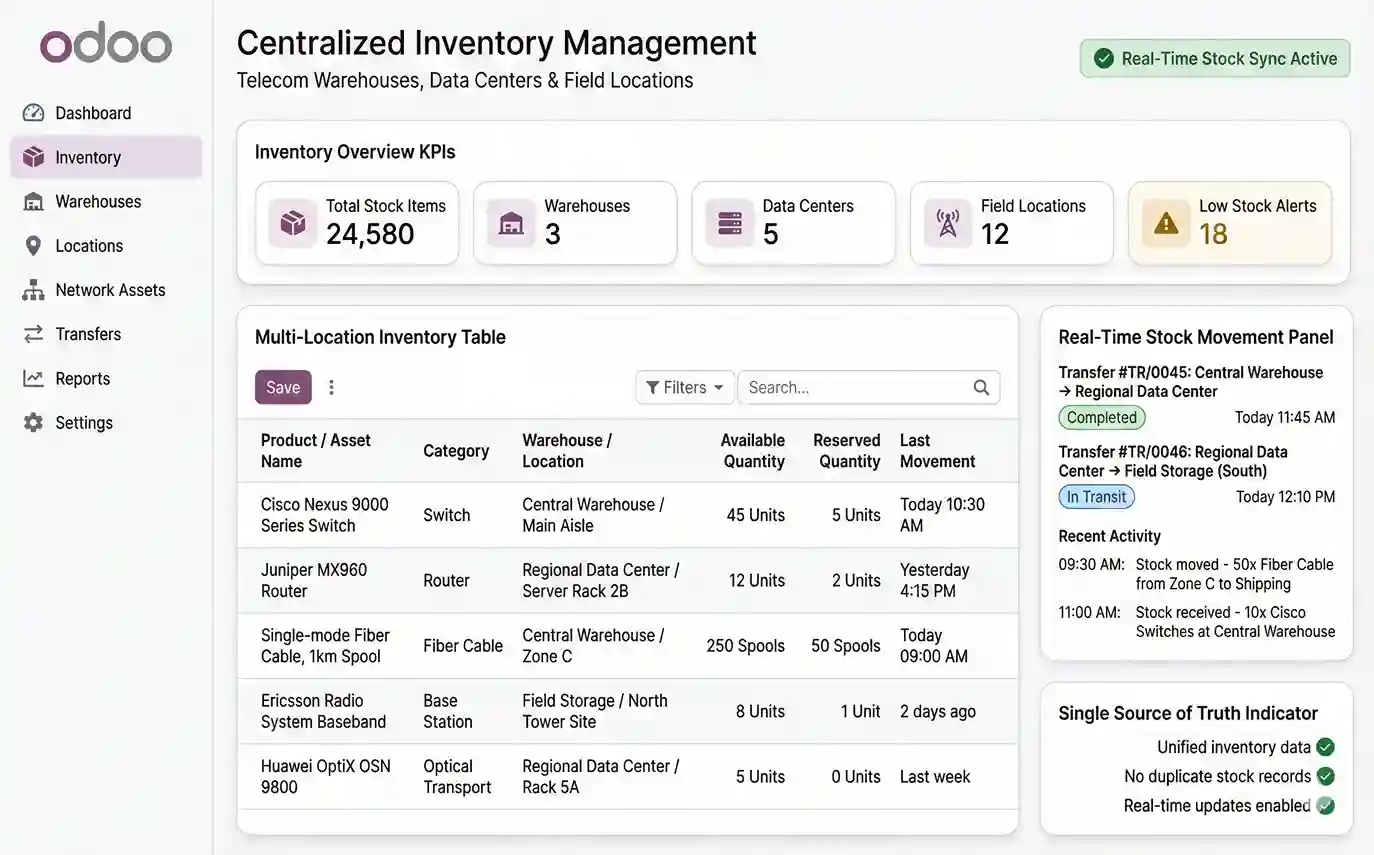
Telecom providers usually operate warehouses, data centers, and field storage locations simultaneously. Managing inventory manually or across multiple systems often results in inaccurate stock data.
With Odoo, telecom companies can:
- Track inventory levels across all warehouses and field locations
- Maintain a single source of truth for stock data
- Monitor real-time stock movement between locations
- Reduce discrepancies caused by manual updates
As a result, inventory accuracy improves and service disruptions are minimized.
Network Equipment and Infrastructure Asset Tracking
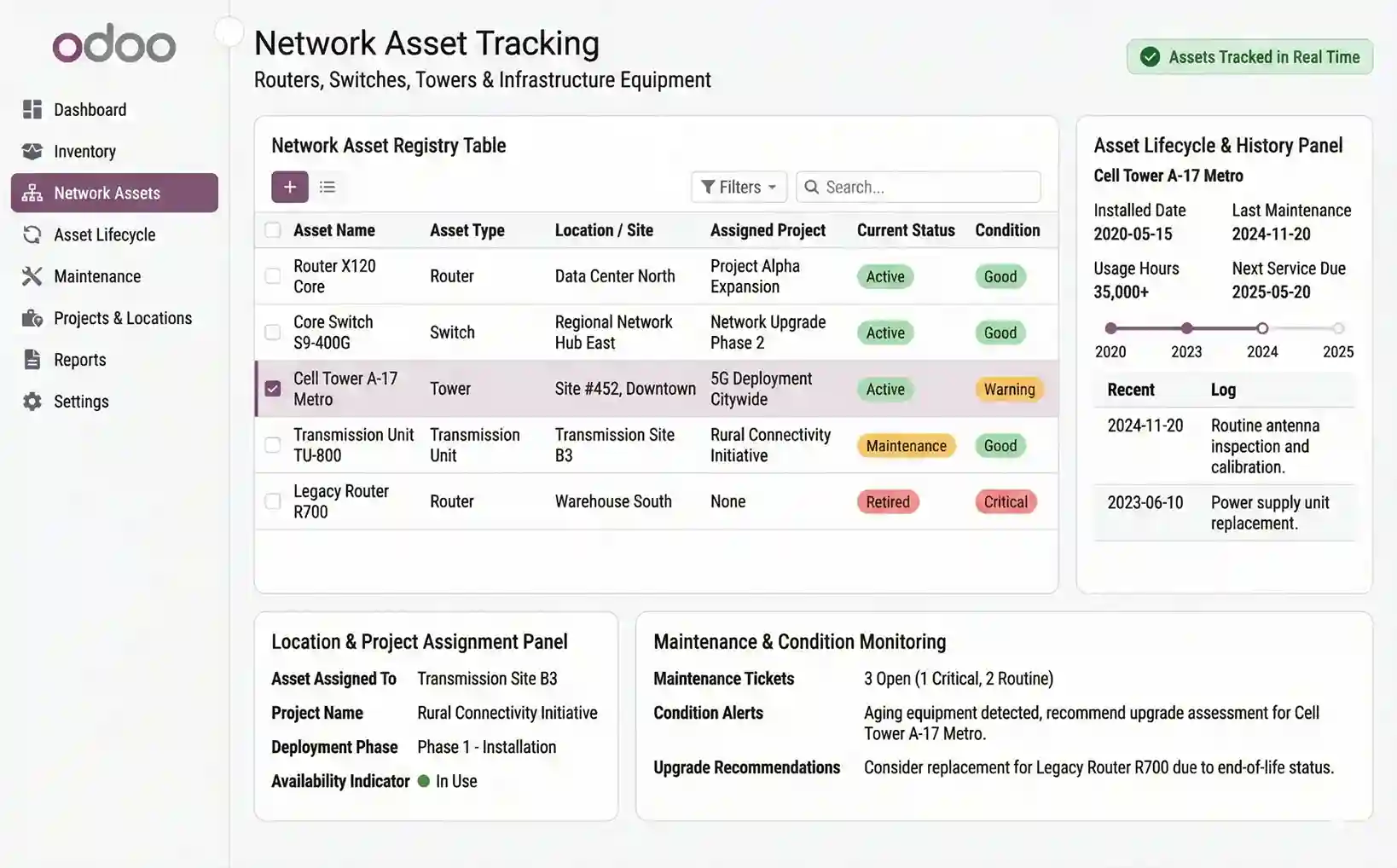
Network assets such as routers, switches, towers, and transmission equipment represent long-term investments. Losing visibility over these assets increases replacement costs and maintenance issues.
Odoo helps telecom businesses:
- Track the complete lifecycle of network equipment
- Record installation, usage, and maintenance history
- Assign assets to specific projects or locations
- Monitor asset availability and condition
This leads to better asset utilization and more informed upgrade planning.
Spare Parts Management for Faster Network Maintenance

Spare part availability plays a crucial role in resolving service interruptions quickly. Poor planning can significantly increase downtime.
Using Odoo, telecom companies can:
- Maintain accurate spare parts inventory
- Identify critical components required for repairs
- Ensure spare parts availability for field technicians
- Reduce delays in network maintenance and restoration
Consequently, service reliability and customer satisfaction improve.
Automated Procurement and Stock Replenishment
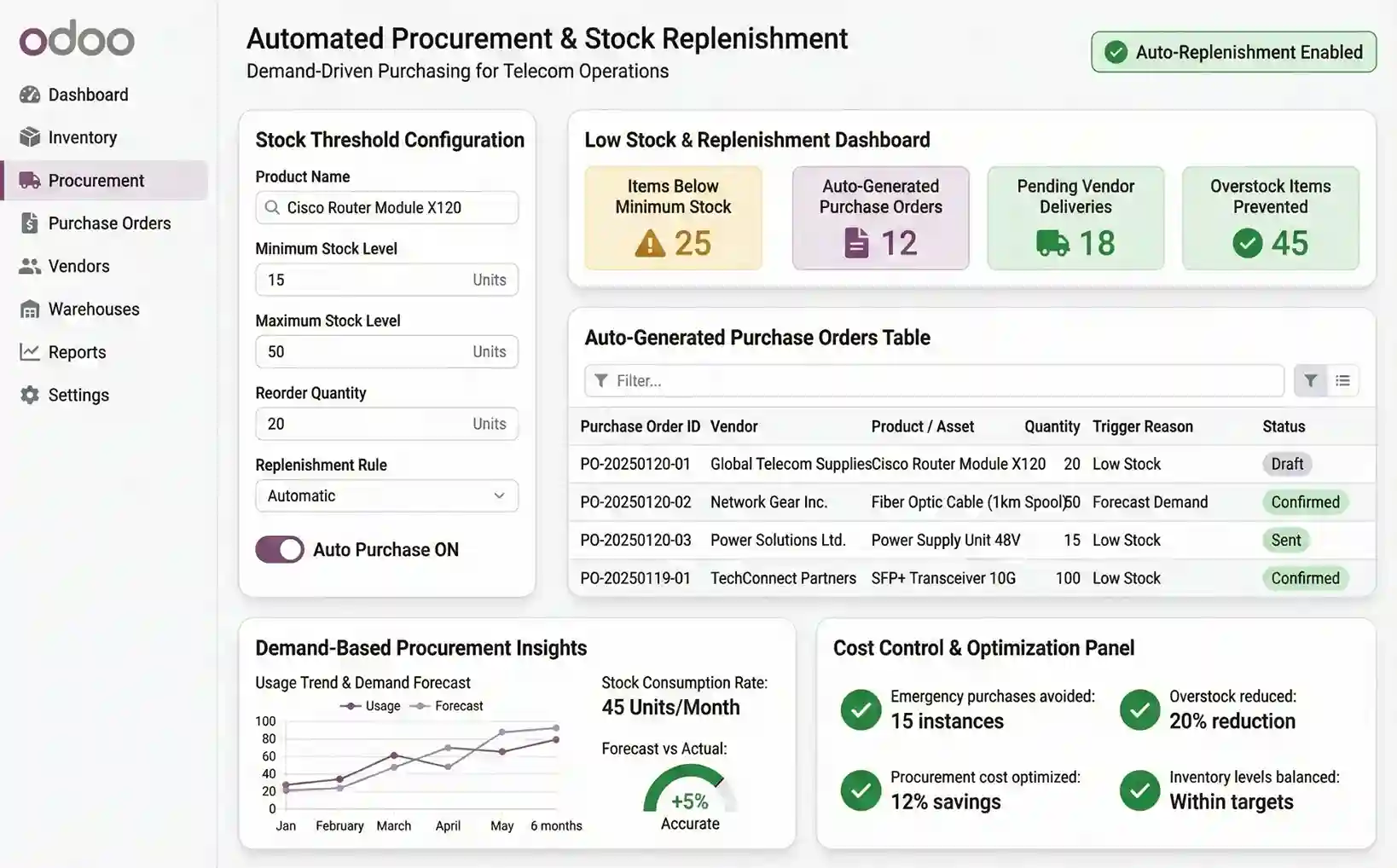
Manual procurement processes often cause delays, overstocking, or emergency purchases at higher costs.
Odoo enables telecom providers to:
- Set minimum and maximum stock thresholds
- Automatically generate purchase orders when stock is low
- Align procurement with actual demand
- Reduce excess inventory and emergency buying
This automation ensures optimal inventory levels while improving cost control.
Integration with Telecom Operations and Field Services
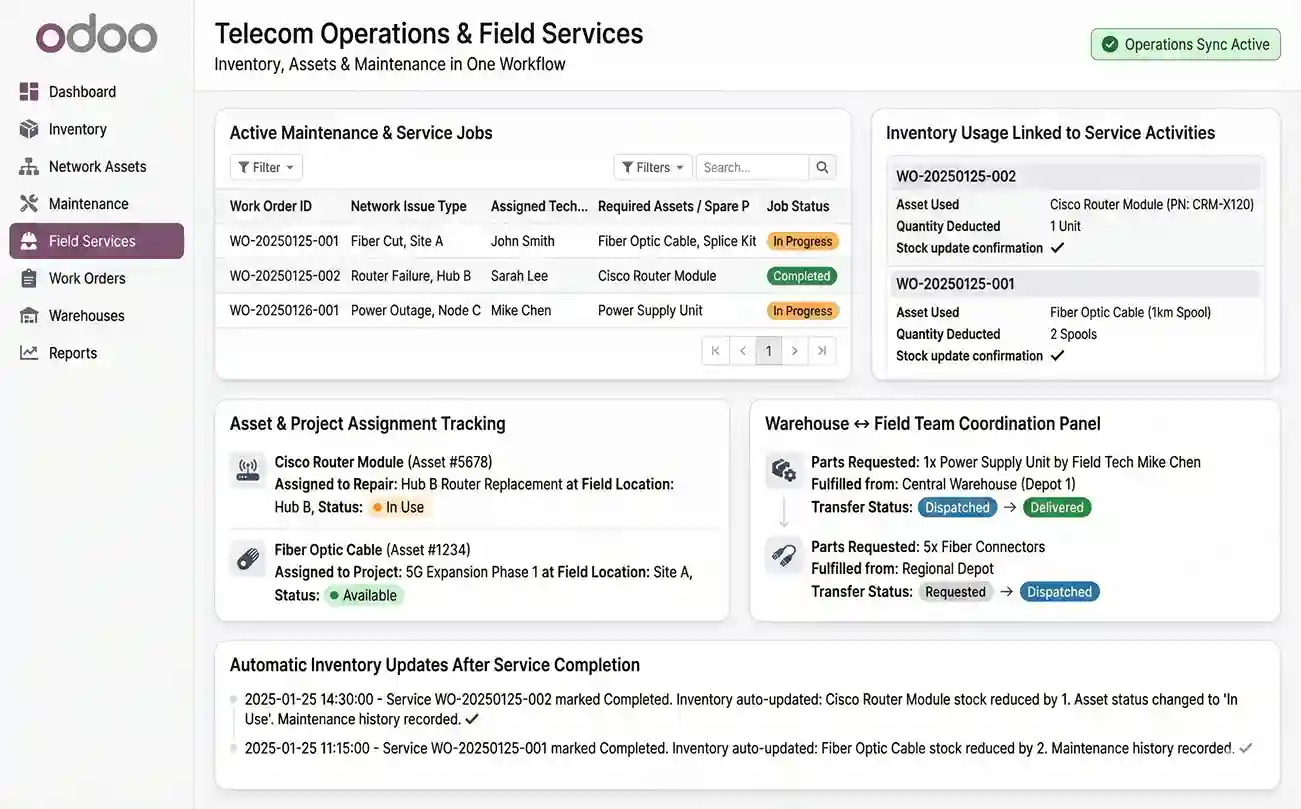
Inventory and asset management must align closely with operations and field service teams to avoid workflow gaps.
Odoo supports this by:
- Linking inventory usage to maintenance and service activities
- Tracking which assets are used for specific repairs or projects
- Improving coordination between warehouse and field teams
- Updating inventory automatically after service completion
As a result, operational workflows become smoother and more transparent.
Advanced Inventory Reporting and Forecasting for Telecom Businesses
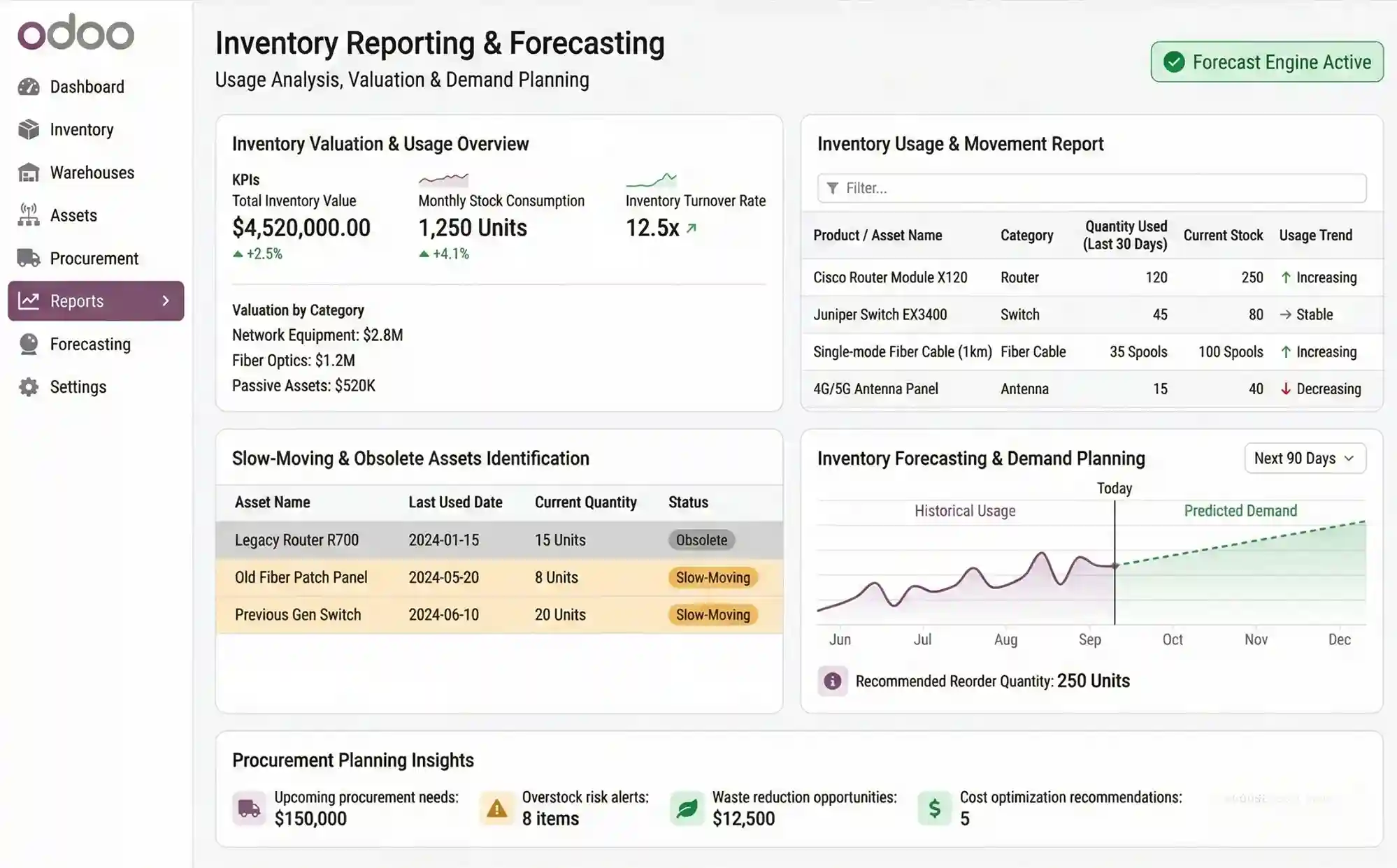
Accurate reporting and forecasting are essential for long-term planning in telecommunications.
Odoo provides:
- Inventory valuation and usage reports
- Identification of slow-moving or obsolete assets
- Forecasting tools for future inventory needs
- Data-driven insights for procurement planning
This helps telecom companies reduce waste, control costs, and plan investments more effectively.
Business Impact of Odoo Inventory and Asset Management
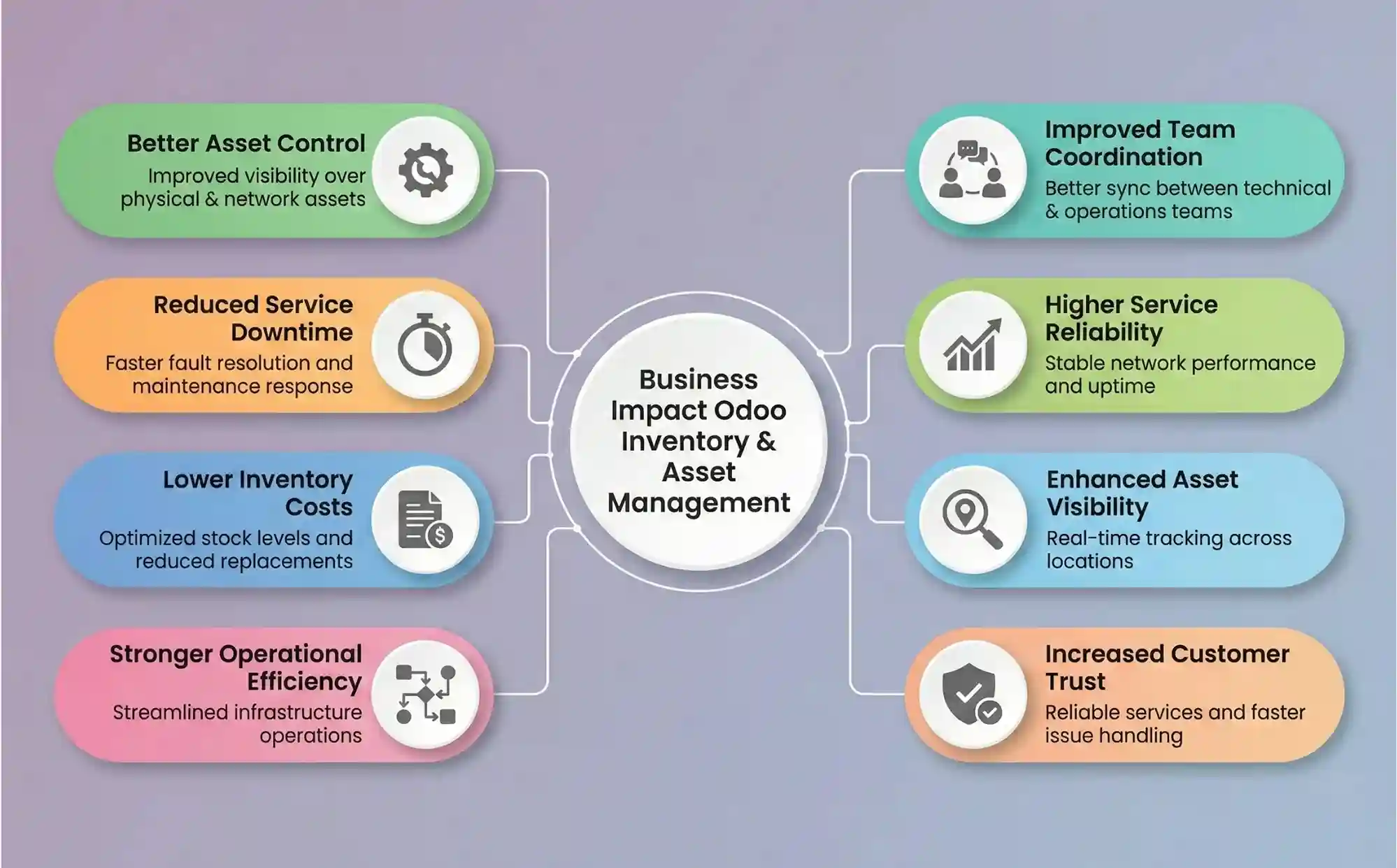
By using Odoo for inventory, asset, and network management, telecom companies achieve:
- Better control over physical and network assets
- Reduced service downtime and faster issue resolution
- Lower inventory holding and replacement costs
- Improved coordination between technical and operational teams
Ultimately, this strengthens service reliability, operational efficiency, and customer trust.These capabilities align closely with network automation via Odoo, helping telecom providers reduce downtime, improve asset visibility, and streamline infrastructure operations.
7. Odoo for Telecommunications: Business Value Overview
This section highlights how Odoo delivers measurable business value to telecommunications companies by addressing core operational, financial, and customer management challenges.
| Business Area | How Odoo Helps | Outcome |
|---|---|---|
| Operations | Centralizes workflows and data | Higher efficiency |
| Billing | Automates recurring and usage-based billing | Fewer errors |
| Customer Management | Unifies customer data and support | Better experience |
| Inventory & Assets | Tracks network equipment and spare parts | Reduced downtime |
| Finance | Real-time reporting and cash flow tracking | Informed decisions |
8. Financial Management and Reporting with Odoo for Telecommunications
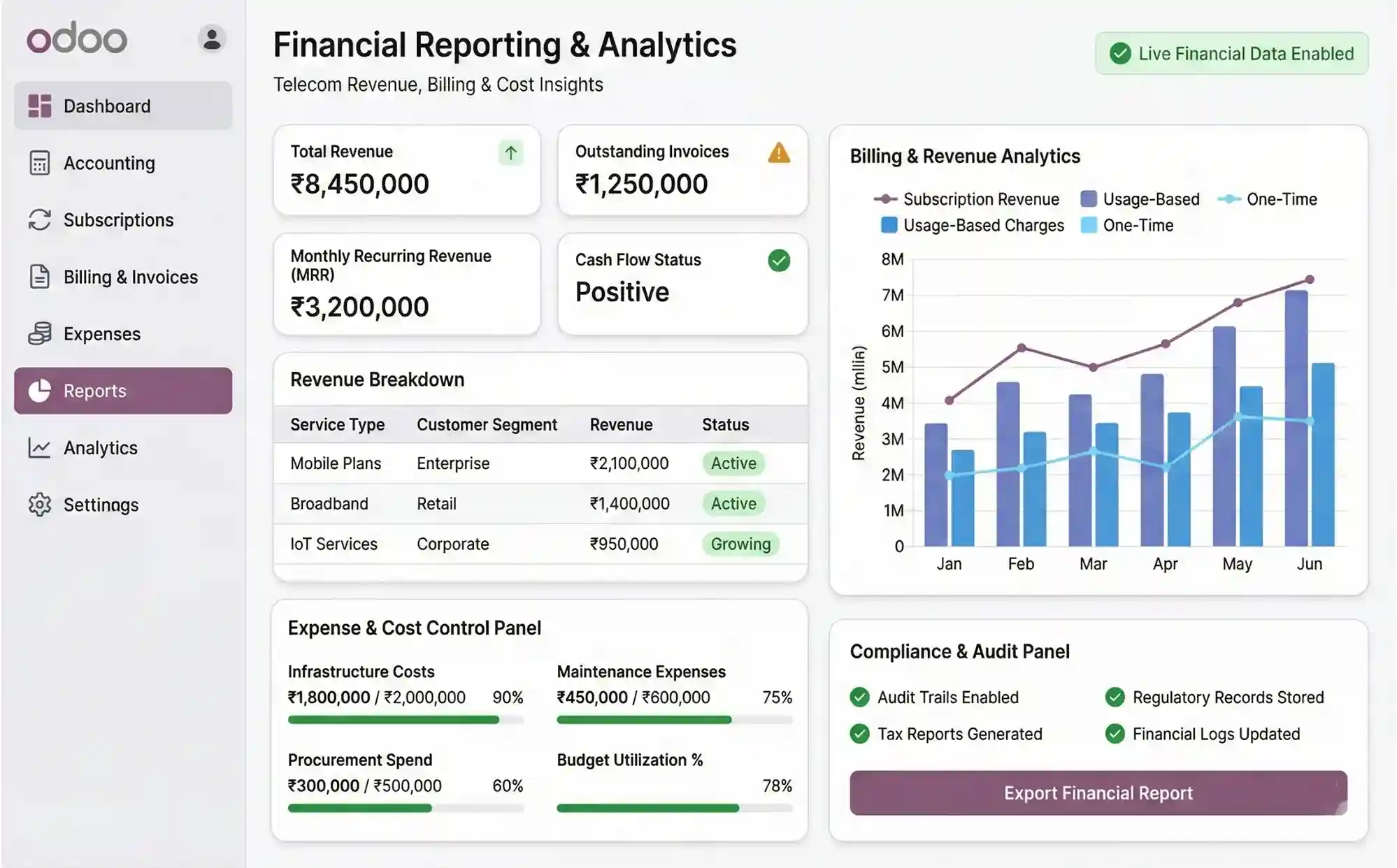
Financial operations in the telecommunications industry are complex due to recurring billing, usage-based charges, multiple service plans, and high operational costs. Without a centralized financial system, telecom companies often face billing errors, revenue leakage, delayed payments, and limited financial visibility.
Odoo for Telecommunications provides a unified financial management framework that automates accounting processes, improves billing accuracy, and delivers real-time financial insights to support informed decision-making.
Automated Accounting and Billing Processes
Manual accounting processes increase the risk of errors, especially in telecom businesses that handle high transaction volumes.
With Odoo, telecom companies can:
- Automate recurring and subscription-based billing
- Generate accurate invoices for usage-based services
- Reduce manual data entry in accounting workflows
- Ensure consistency between billing and financial records
As a result, finance teams spend less time on manual tasks and more time on analysis and planning.
Revenue Tracking and Cash Flow Visibility
Telecom businesses rely heavily on predictable and accurate revenue streams. However, fragmented systems make it difficult to track income across services and customers.
Odoo enables telecom providers to:
- Track revenue by service type, customer, or region
- Monitor outstanding invoices and payment status
- Improve cash flow forecasting
- Identify revenue leakage early
This visibility helps businesses maintain financial stability and improve liquidity.
Expense Management and Cost Control
Telecom operations involve significant expenses related to infrastructure, maintenance, staffing, and procurement. Without proper tracking, costs can quickly exceed budgets.
Using Odoo, telecom companies can:
- Record and categorize operational expenses
- Track costs by department or project
- Monitor spending against budgets
- Identify cost-saving opportunities
Consequently, businesses gain better control over expenses and improve profitability.
Real-Time Financial Reporting and Dashboards
Timely financial insights are essential for strategic decision-making in the telecom industry.
Odoo provides real-time access to:
- Profit and loss statements
- Balance sheets
- Cash flow reports
- Revenue and expense summaries
With live dashboards, management teams can quickly assess financial performance and respond to changes proactively.
Compliance, Auditing, and Financial Transparency
Telecom companies must meet strict regulatory and compliance requirements related to billing accuracy, taxation, and financial reporting.
Odoo supports compliance by:
- Maintaining detailed audit trails
- Storing structured financial records
- Supporting tax and regulatory reporting
- Improving transparency across financial operations
This reduces audit risks and ensures regulatory readiness.
Integration with Telecom Operations
Financial management should align closely with sales, billing, inventory, and service operations.
Odoo integrates finance with:
- Sales and subscription management
- Inventory and asset usage
- Service provisioning and support
- Procurement and vendor payments
As a result, financial data remains accurate, consistent, and aligned with operational activities.
Business Impact of Financial Management with Odoo
By using Odoo for financial management and reporting, telecom companies achieve:
- Higher billing accuracy and reduced disputes
- Improved cash flow and revenue predictability
- Better cost control and budgeting
- Faster and more informed financial decisions
- Stronger compliance and audit readiness
Ultimately, this enables telecom businesses to operate with greater financial confidence and long-term stability.
9. Why Choose SDLC Corp for Odoo Telecommunications Implementation
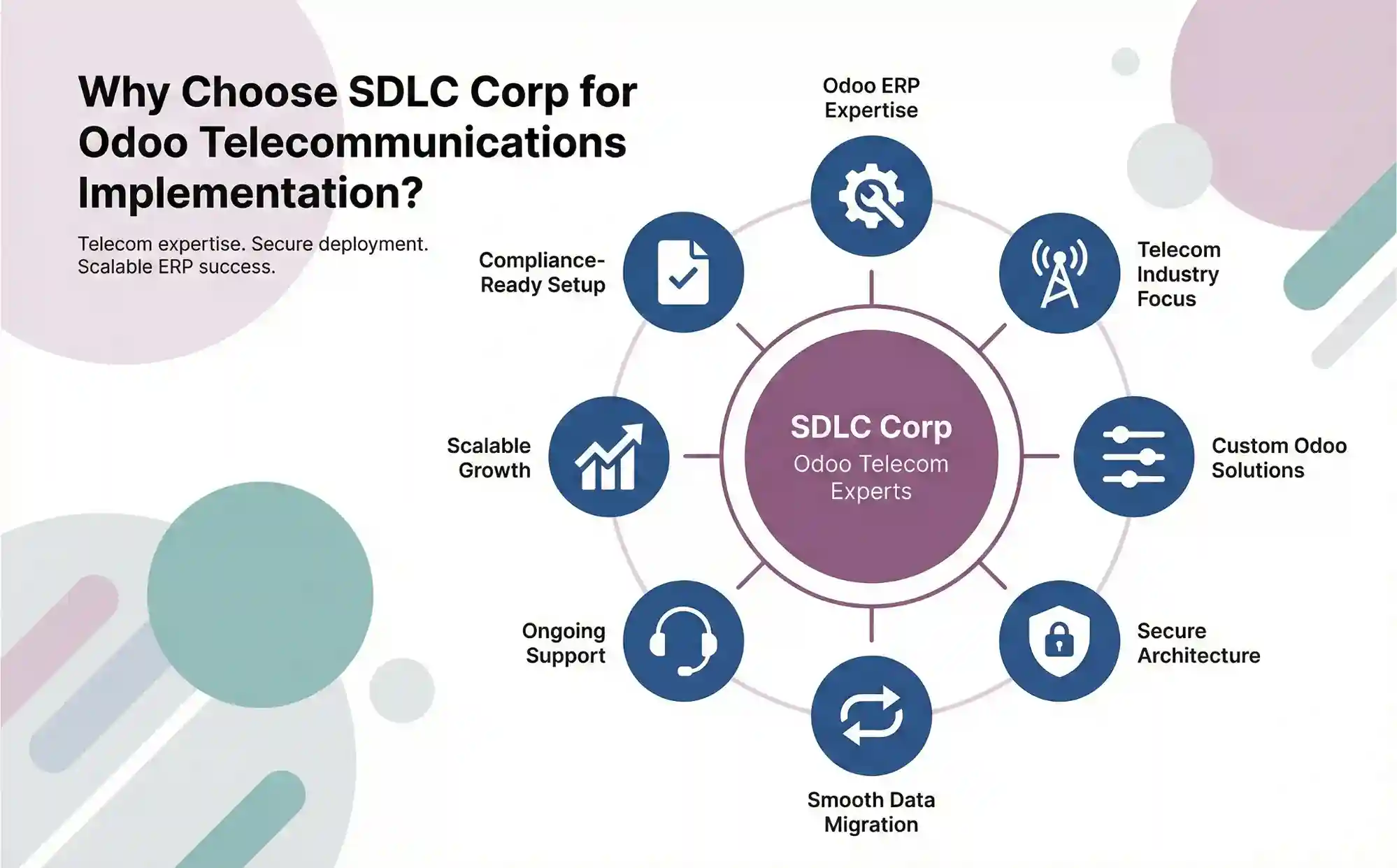
Choosing the right implementation partner is as important as selecting the right ERP system. Telecommunications businesses require a partner who understands both Odoo technology and telecom-specific operational challenges. SDLC Corp combines deep Odoo expertise with industry-focused implementation experience to deliver scalable and reliable ERP solutions for telecom companies.
Deep Expertise in Odoo ERP Solutions
SDLC Corp has extensive experience in designing, developing, and deploying Odoo ERP solutions across multiple industries, including telecommunications.
With SDLC Corp, telecom businesses benefit from:
- Certified Odoo developers and consultants
- Strong expertise in Odoo customization and module development
- Proven experience with complex ERP implementations
- End-to-end Odoo services from planning to deployment
This ensures that the ERP solution is technically sound and aligned with business goals.
Industry-Focused Telecommunications Understanding
Telecom operations involve unique challenges such as recurring billing, usage-based pricing, customer lifecycle management, and network asset tracking. SDLC Corp understands these complexities and tailors Odoo accordingly.
Key telecom-focused strengths include:
- Custom workflows for telecom billing models
- Integration of CRM, billing, inventory, and support
- Support for multi-service and subscription-based operations
- Alignment with telecom compliance and reporting needs
As a result, telecom businesses receive solutions built specifically for their operational realities.
Customized Odoo Solutions, Not One-Size-Fits-All
Every telecom business operates differently. SDLC Corp focuses on delivering customized Odoo solutions rather than generic implementations.
Customization benefits include:
- ERP workflows aligned with existing business processes
- Custom dashboards and reports for telecom KPIs
- Flexible system design to support future expansion
- Seamless integration with third-party tools and systems
This approach ensures higher user adoption and long-term value.
Smooth Implementation and Data Migration
ERP implementation in telecom environments often involves complex data structures and large volumes of historical data. SDLC Corp follows a structured and proven implementation methodology.
Implementation services include:
- Detailed requirement analysis and planning
- Secure data migration from legacy systems
- System testing and performance validation
- User training and onboarding support
This minimizes disruption and ensures a smooth transition to Odoo.
Ongoing Support and Long-Term Partnership
ERP success does not end with deployment. SDLC Corp provides continuous support to ensure system stability and performance.
Post-implementation support includes:
- Technical support and issue resolution
- Performance optimization
- Feature enhancements and upgrades
- Long-term system scalability planning
As a result, telecom businesses gain a reliable technology partner for sustained growth.
Business Impact of Partnering with SDLC Corp
By choosing SDLC Corp for Odoo telecommunications implementation, businesses achieve:
- Faster and smoother ERP deployment
- Reduced operational risks
- Improved system adoption by teams
- Scalable ERP architecture for future growth
- Strong return on ERP investment
Ultimately, SDLC Corp helps telecom companies unlock the full potential of Odoo ERP.
Conclusion
The telecommunications industry requires efficient, scalable, and data-driven systems to manage complex operations and rising customer expectations. Odoo for Telecommunications offers a unified ERP solution that streamlines workflows, improves billing accuracy, and enhances operational visibility. With expert guidance from professional Odoo Consulting Services, telecom businesses can successfully implement Odoo, reduce inefficiencies, and build a strong foundation for long-term growth.
FAQs
What is Odoo ERP for Telecommunications?
Odoo ERP for Telecommunications is an integrated business management solution that helps telecom companies manage network assets, inventory, billing, customer relationships, field operations, and financials from a single platform. It replaces disconnected systems with a centralized, scalable ERP.
How does Odoo help manage telecom inventory and network assets?
Odoo enables telecom providers to track network equipment, SIM cards, routers, towers, and spare parts in real time across multiple locations. With serial number tracking and automated replenishment, companies reduce asset loss, downtime, and inventory costs.
Can Odoo automate billing and invoicing for telecom services?
Yes. Odoo supports automated recurring billing, usage-based invoicing, contract management, and tax compliance, making it ideal for telecom subscription models, prepaid/postpaid services, and enterprise billing scenarios.
Is Odoo suitable for growing telecom companies?
Absolutely. Odoo is highly scalable and modular, allowing telecom businesses to start with core modules and expand as they grow. It supports multi-company, multi-location, and high transaction volumes without performance issues.
How does Odoo improve telecom operations and decision-making?
Odoo provides real-time dashboards, KPI tracking, and advanced reporting for network performance, service delivery, revenue, and customer satisfaction. This enables faster decision-making, proactive issue resolution, and better strategic planning.
Why is SDLC Corp the best choice for Odoo development for Telecommunications?
SDLC Corp is the best choice for Odoo development for telecommunications due to its extensive industry experience, certified Odoo developers, and proven success delivering telecom-specific ERP solutions. SDLC Corp offers end-to-end services—including customization, integration, migration, and long-term support—ensuring scalable, secure, and ROI-driven Odoo implementations tailored to telecom business needs.




